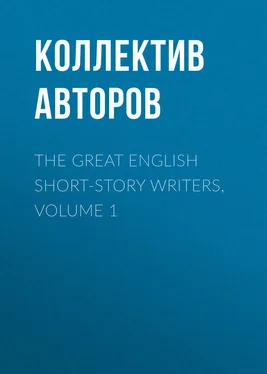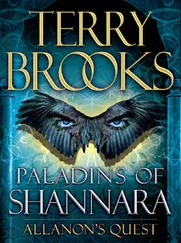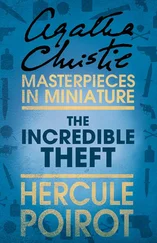Коллектив авторов - The Great English Short-Story Writers, Volume 1
Здесь есть возможность читать онлайн «Коллектив авторов - The Great English Short-Story Writers, Volume 1» — ознакомительный отрывок электронной книги совершенно бесплатно, а после прочтения отрывка купить полную версию. В некоторых случаях можно слушать аудио, скачать через торрент в формате fb2 и присутствует краткое содержание. Жанр: foreign_antique, foreign_prose, на английском языке. Описание произведения, (предисловие) а так же отзывы посетителей доступны на портале библиотеки ЛибКат.
- Название:The Great English Short-Story Writers, Volume 1
- Автор:
- Жанр:
- Год:неизвестен
- ISBN:нет данных
- Рейтинг книги:3 / 5. Голосов: 1
-
Избранное:Добавить в избранное
- Отзывы:
-
Ваша оценка:
- 60
- 1
- 2
- 3
- 4
- 5
The Great English Short-Story Writers, Volume 1: краткое содержание, описание и аннотация
Предлагаем к чтению аннотацию, описание, краткое содержание или предисловие (зависит от того, что написал сам автор книги «The Great English Short-Story Writers, Volume 1»). Если вы не нашли необходимую информацию о книге — напишите в комментариях, мы постараемся отыскать её.
The Great English Short-Story Writers, Volume 1 — читать онлайн ознакомительный отрывок
Ниже представлен текст книги, разбитый по страницам. Система сохранения места последней прочитанной страницы, позволяет с удобством читать онлайн бесплатно книгу «The Great English Short-Story Writers, Volume 1», без необходимости каждый раз заново искать на чём Вы остановились. Поставьте закладку, и сможете в любой момент перейти на страницу, на которой закончили чтение.
Интервал:
Закладка:
This masterpiece of Defoe is before its time by a hundred years; nothing can be found in the realm of the English prose short-story to approach it in symmetry until the Ettrick Shepherd commenced to write.
Of all the models of prose-fiction which the Tudor translations had given to English literature, the first to be copied was that of Cervantes's Don Quixote , rendered into English by Thomas Shelton in 1612. Swift must have had the rambling method of Cervantes well in mind when he wrote his Gulliver ; and Smollett confessedly took it as his pattern and set out to imitate. The most that was required by such a method in the way of initial construction was to select a hero, give some account of his early history, from the day of his birth up to the point where the true narrative commences, and then send him upon his travels. Usually it was thought necessary to have a Sancho to act as background to Don Quixote; thus Crusoe is given his Man Friday, Tom Jones his Mr. Partridge, and Roderick Random his Strap; but this was not always done, for both Gulliver and the hero of the Sentimental Journey set out on their journeyings unaccompanied. The story which grew out of such a method usually consisted of a series of plots, anecdotes, and incidents linked together only by the characters, and governed by no unifying purpose which made each one a necessary and ascending step toward a prearranged climax. These early novels are often books of descriptive travel rather than novels in the modern sense; the sole connection between their first incident and their last being the long road which lies between them, and has been traversed in the continual company of the same leading characters. Many of the chapters, taken apart from their context, are short-story themes badly handled. Some of them are mere interpolations introduced on the flimsiest of excuses, which arrest the progress of the main narrative — i. e ., the travel – and give the author an opportunity to use up some spare material which he does not know what to do with. Such are "The Man of the Hill," in Tom Jones ; "The History of Melopoyn the Playwright" in Roderick Random ; the "Memoirs of a Lady of Quality," occupying fifty-three thousand words, in Peregrine Pickle ; "The Philosophic Vagabond," in the Vicar of Wakefield ; and "Wandering Willie's Tale," in Redgauntlet . The reason why the eighteenth-century novelist did not know what to do with these materials was, in certain cases, that he had discovered a true short-story theme and was perplexed by it. He knew that it was good – his artist's instinct made him aware of that; but somehow, to his great bewilderment and annoyance, it refused to be expanded. So, in order that it might not be entirely lost to him, he tied the little boat on behind the great schooner of his main narration, and set them afloat together.
By the modern reader, whether of the short-story or the novel, the lack of atmosphere and of immediateness in eighteenth-century prose-fiction is particularly felt. There is no use made of landscapes, moods, and the phenomena of nature; the story happens at almost any season of the year. Of these things and their use the modern short-story writer is meticulously careful. By how much would the worth of Hardy's The Three Strangers be diminished if the description of the March rain driving across the Wessex moorland were left out? Before he commences the story contained in A Lodging for the Night , Stevenson occupies three hundred words in painting the picture of Paris under snow. In the same way, in his story of The Man Who Would Be King , Kipling is at great pains to make us burn with the scorching heat which, in the popular mind, is associated with India. For such effects you will search the prose-fiction of the eighteenth century in vain; whereas the use of atmosphere has been carried to such extremes to-day by certain writers that the short-story in their hands is in danger of becoming all atmosphere and no story.
The impression created by the old technique, such as it was, when contrasted with the new, when legitimately handled, is the difference between reading a play and seeing it staged.
As regards immediateness of narration, Laurence Sterne may, perhaps, be pointed out as an example. But he is not immediate in the true sense; he is abrupt, and this too frequently for his own sly purposes – which have nothing to do with either technique or the short-story.
Most of the English short-stories, previous to those written by James Hogg, are either prefaced with a biography of their main characters or else the biography is made to do service as though it were a plot – nothing is left to the imagination. Even in the next century, when the short-story had come to be recognized in America, through the example set by Hawthorne and Poe, as a distinct species of literary art, the productions of British writers were too often nothing more than compressed novels. In fact, it is true to say that there is more of short-story technique in the short-story essays of Goldsmith and Lamb than can be found in many of the brief tales of Dickens and Anthony Trollope, which in their day passed muster unchallenged as short-stories.
VIII
But between the irrelevant brief story, interpolated in a larger narrative, and the perfect short-story, which could not be expanded and is total in itself, of Hawthorne and Poe, there stands the work of a man who is little known in America, and by no means popular in England, that of the Ettrick Shepherd, James Hogg. He was born in Scotland, among the mountains of Ettrick and Yarrow, the son of a shepherd. When he was but six years old he commenced to earn his living as a cowherd, and by his seventh year had received all the schooling which he was destined to have – two separate periods of three months. Matthew Arnold, when accounting for the sterility of Gray as a poet, says that throughout the first nine decades of the eighteenth century, until the French Revolution roused men to generosity, "a spiritual east wind was blowing." Hogg's early ignorance of letters had at least this advantage, that it saved him from the blighting intellectual influences of his age – left him unsophisticated, free to find in all things matter for wonder, and to work out his mental processes unprejudiced by a restraining knowledge of other men's past achievements. In his eighteenth year he taught himself to read, choosing as his text-books Henry the Minstrel's Life and Adventures of Sir William Wallace and the Gentle Shepherd of Allan Ramsay. Not until his twenty-sixth year did he acquire the art of penmanship, which he learned "upon the hillside by copying the Italian alphabet, using his knee as his desk, and having the ink-bottle suspended from his button." During the next fourteen years he followed his shepherd's calling, making it romantic with sundry more or less successful attempts at authorship. He had reached his fortieth year before he abandoned sheep-raising and journeyed to Edinburgh, there definitely to adopt the literary career. He was by this time firm in his philosophy of life and established in his modes of thought; whatever else he might not be, among townsmen and persons of artificial training, his very simplicity was sure to make him original. In his forty-seventh year, having so far cast his most important work into the poetic form, he contributed to Blackwood's Magazine his Shepherd's Calendar , followed in the same year by the publishing of The Brownie of Bodsbeck ; these were his first two serious excursions into the realm of prose-fiction. From then on until his death, in 1835, he continued his efforts in this direction, pouring out a mass of country-side tradition and fairy-folklore, amazing in its fantasy and wealth of drama.
Читать дальшеИнтервал:
Закладка:
Похожие книги на «The Great English Short-Story Writers, Volume 1»
Представляем Вашему вниманию похожие книги на «The Great English Short-Story Writers, Volume 1» списком для выбора. Мы отобрали схожую по названию и смыслу литературу в надежде предоставить читателям больше вариантов отыскать новые, интересные, ещё непрочитанные произведения.
Обсуждение, отзывы о книге «The Great English Short-Story Writers, Volume 1» и просто собственные мнения читателей. Оставьте ваши комментарии, напишите, что Вы думаете о произведении, его смысле или главных героях. Укажите что конкретно понравилось, а что нет, и почему Вы так считаете.












